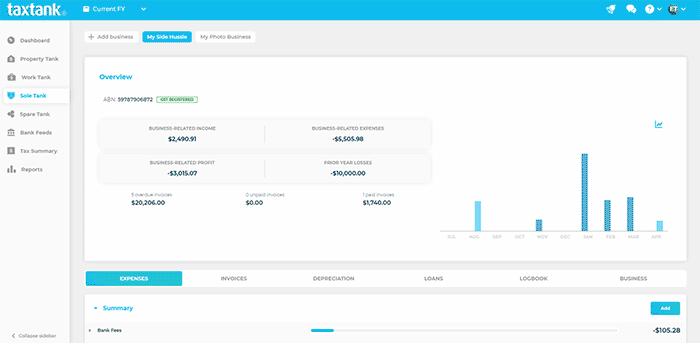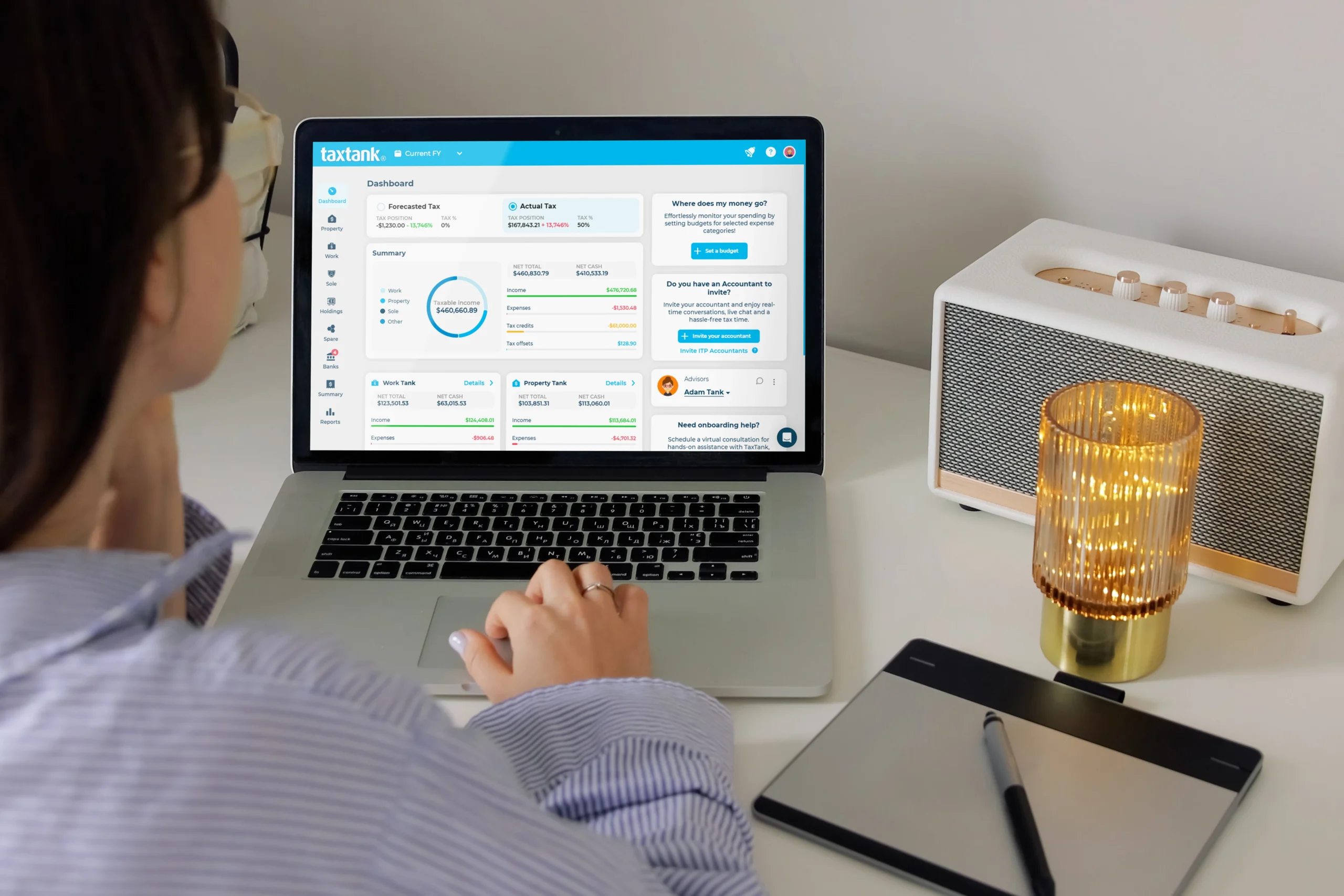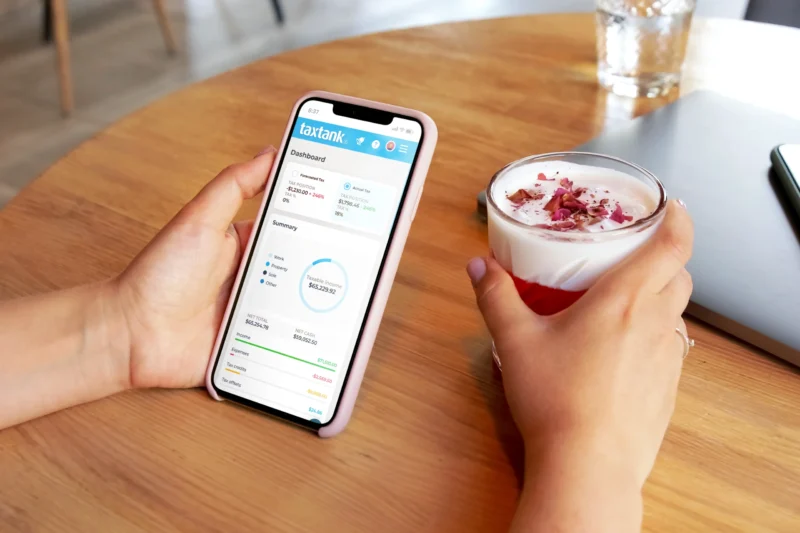When operating as a sole trader in Australia, having an ABN (Australian Business Number) is essential for handling tax obligations. ABN tax calculation can seem complex, but with the right tools, such as TaxTank, it becomes significantly easier and more efficient. In this article, we’ll provide detailed guidance on how to calculate your tax liabilities, what deductions are available, and the implications of GST, income tax, and superannuation for sole traders. Plus, we’ll show how TaxTank can simplify these processes, giving you real-time tax calculations and a clear view of your financial position.
What is an ABN?
An ABN is a unique 11-digit number issued to businesses by the Australian Business Register (ABR). Sole traders must have an ABN to legally operate a business, issue invoices, and register for GST if required. Having an ABN also simplifies interactions with the Australian Taxation Office (ATO) when filing tax returns and claiming deductions.
To streamline these interactions, TaxTank offers features specifically designed for sole traders. From tracking income to instantly calculating deductions, TaxTank ensures you meet your tax obligations without the stress. TaxTank’s real-time ABN tax calculation feature helps sole traders stay on top of their tax obligations.
Key Taxes for ABN Holders
Income Tax for ABN Holders – How does it work?
Did you know that under one ABN, you can operate up to six different businesses, each requiring its own business schedule? Managing these businesses can be complicated, especially at tax time. But with TaxTank, it’s a breeze! TaxTank allows you to manage one or multiple businesses in a single account, automatically generating separate business schedules for each one, simplifying tax time and ensuring compliance.
Key Taxes for ABN Holders
As a sole trader, all income earned under your ABN must be reported as part of your individual income tax return. Taxable income is calculated by subtracting your allowable deductions from your total business revenue.
Example:
Let’s say you operate two businesses; a consulting firm and drive part-time for Uber under the same ABN. Here’s how TaxTank makes it easy:
- Your consulting business generates $100,000 in gross income, with $30,000 in deductions.
- Your Uber driving side gig brings in $20,000 in gross income, with $5,000 in deductions.
TaxTank will generate separate business schedules for each, allowing you to track your taxable income and projected tax liability in real-time through efficient ABN tax calculation tools.

Income Tax Calculation Example
Here’s how the numbers look:
Consulting business:
Gross income: $100,000
Deductions: $30,000
Taxable income: $70,000
Uber driving:
Gross income: $20,000
Deductions: $5,000
Taxable income: $15,000
For the 2023-24 financial year, your tax will be calculated based on Australian individual tax rates:
- The first $18,200 is tax-free (0%)
- $18,201 – $45,000 is taxed at 19%
- $45,001 – $120,000 is taxed at 32.5%
With TaxTank, this process is automated. The software calculates your tax liability based on real-time data, reducing the risk of errors and ensuring accuracy. So whether you have one business or six, TaxTank makes ABN tax calculation easy to stay on top of your taxes all year long!
Tip: Keep Up with Tax Rate Changes
Tax rates can change each financial year, and it’s essential to stay informed to ensure accurate tax planning. For the 2024/25 financial year, here are the updated tax brackets:
- The first $18,200 remains tax-free (0%)
- $18,201 – $50,000 is taxed at 19%
- $50,001 – $130,000 is taxed at 30%
- $130,001 – $200,000 is taxed at 37%
- $200,001 and above is taxed at 45%
With TaxTank, these changes are seamlessly incorporated into your tax calculations, ensuring you’re always up to date with the latest rates and prepared for the next tax season!
GST and ABN Holders – When do you need to register for GST?
If your annual turnover exceeds $75,000, the ATO requires you to register for Goods and Services Tax (GST) across all your businesses under the same ABN. Once registered, you must charge 10% GST on your goods and services and remit it to the ATO via Business Activity Statements (BAS). However, here’s the fun part; some industries, like rideshare driving for Uber, require GST registration regardless of turnover. Yes, even if you’re only earning $20,000 driving part-time, the ATO still insists you sign up for GST. Why? Because they can, apparently.
This rule applies to other industries too, such as taxi drivers and certain other service providers. So, if you’re an Uber driver, even if you don’t hit the $75,000 threshold, you’re still roped into GST reporting.
Example:
Let’s say your consulting business brings in $100,000 (GST-exclusive), and your Uber driving adds $20,000. Both must be accounted for under the same ABN. Here’s how GST would be calculated across your businesses:
- Total business turnover (Consulting + Uber): $120,000
- GST collected: 10% of $120,000 = $12,000
- GST credits (for business expenses): $3,000
- Net GST payable to ATO: $12,000 – $3,000 = $9,000
With TaxTank, managing this is easy. It automatically tracks your income and expenses across all businesses and generates the necessary BAS. You can track your GST credits and liabilities in real-time, avoiding any surprise bills at the end of the quarter. And hey, at least TaxTank’s spowerful ABN tax calculation features ensure full compliance with ATO requirements.
Deductions for ABN Holders
As a sole trader, you can claim deductions on a wide range of business expenses, reducing your taxable income and lowering your overall tax liability. With TaxTank, tracking and claiming deductions is made effortless, so you don’t miss out on potential savings.
Common Deductions Include:
Vehicle and Travel Expenses:
If you use your vehicle for work, whether it’s for Uber driving or meeting clients, you can claim a deduction. Choose between claiming based on the distance travelled (cents per kilometre) or by calculating actual vehicle operating costs, such as fuel, insurance, and maintenance. TaxTank tracks these automatically for you, making ABN Tax Calculation easier.
Business-Related Equipment:
The cost of items like laptops, software, and tools used for business purposes are deductible. Smaller items may qualify for the instant asset write-off, while larger purchases might need to be depreciated (more on that below).
Professional Services:
Fees paid to accountants, tax advisors, or legal professionals who assist with your business are deductible. So, when you pay someone to help you navigate the ATO’s ever-changing tax rules, those fees can lower your taxable income.
Home Office Expenses:
If you run your business from home, you can claim a portion of household bills based on your business usage. The eligible deductions include:
- Utilities: A percentage of your electricity, gas, and water bills can be claimed if you use a dedicated space in your home for business purposes. For example, if your home office takes up 10% of your home’s floor space, you can claim 10% of your utility costs.
- Internet and Phone: If you use your home internet or phone for business purposes, you can claim a proportion of the costs based on business usage. For instance, if 60% of your internet is used for business, you can claim 60% of the total cost.
- Cleaning and Maintenance: Expenses related to cleaning and maintaining your home office space are also deductible.

TaxTank helps you track these expenses and apply the correct percentage for business use, ensuring you don’t miss out on valuable deductions, helping to optimise ABN Tax Calculation.
Depreciation:
For larger purchases, you might need to claim depreciation over time rather than deducting the full cost in the year of purchase. TaxTank automatically calculates and tracks depreciation so you don’t have to worry about missing deductions.
Understanding Depreciation:
- Instant Asset Write-Off: For assets costing up to $20,000 (for 2023-24), you can claim the full cost in the year of purchase. This is ideal for items like laptops or office furniture.
- General Depreciation Pool: For higher-value assets that don’t qualify for the instant write-off, the ATO requires you to place them in the small business general pool. In the first year, assets are depreciated at 15%, and for subsequent years, they are depreciated at 30%. This applies to large purchases like vehicles or expensive machinery, and TaxTank tracks these assets year after year, ensuring maximum benefit.
Example of Claiming Deductions:
Let’s say you run a consulting business from home and drive part-time for Uber, operating both under the same ABN. Your expenses and deductions might look like this:
| Expense Category | Deduction Amount |
| Vehicle and travel expenses (Uber) | $5,000 |
| Home office expenses (Consulting) | $2,000 |
| Business equipment purchases | $3,000 |
| Professional services | $1,000 |
| Depreciation (Office computer) | $1,000 |
| Depreciation (Vehicle in general pool) | $4,500 (first year) |
| Total Deductions | $16,500 |
With TaxTank, all of these expenses are tracked, categorised, and the correct depreciation rates applied to eligible assets, ensuring no deduction is missed while managing your ABN Tax Calculation.
Business Concessions:
Don’t forget about small business concessions like the instant asset write-off and simplified depreciation rules. These can make a significant difference in reducing your taxable income. With TaxTank, you’ll always be kept up-to-date on changes to these rules, so you can make informed decisions and claim deductions at the right time.
💡Pro Tip: Depreciation on big-ticket items like vehicles can significantly reduce your tax liability. With TaxTank handling the details, you can maximise your deductions without having to navigate the ATO’s complex depreciation rules on your own.
Superannuation for ABN Holders
Sole traders are responsible for their own superannuation. Although it’s not compulsory to pay yourself super, it’s highly recommended for future financial security. Contributions to super are tax-deductible, reducing your taxable income.
You can contribute up to the concessional (pre-tax) contributions cap, which is $27,500 for the 2023-24 financial year. Super contributions are taxed at 15%, which is generally lower than personal income tax rates.
Example of Super Contribution Deduction:
- Super contribution: $10,000
- Tax on contribution (15%): $1,500
- Deduction on taxable income: $10,000
- Tax saving (32.5% tax rate): $3,250 – $1,500 (super tax) = $1,750
By contributing to your super, not only are you investing in your future, but you’re also benefiting from an immediate tax deduction. With TaxTank, tracking your super contributions is easy, ensuring you maximise your entitlements and stay on top of your financial planning.
PAYG Instalments for ABN Holders
How PAYG Works:
Based on your previous tax returns or estimated income for the current year, the ATO will notify you if you’re required to make PAYG instalments. The amount is calculated based on your expected income, ensuring you are contributing toward your tax liability throughout the year, rather than paying it all in one lump sum at the end.
PAYG Instalment Example:
Let’s say your projected annual tax liability is $13,217. TaxTank will automatically calculate your quarterly PAYG instalments as approximately $3,304, breaking down your payments into more manageable chunks. By making these quarterly payments, you avoid any surprises or large tax bills at the end of the financial year.
Why PAYG is Important:
- Cash Flow Management: Instead of dealing with one big tax bill at the end of the year, PAYG helps spread the cost across four payments. This keeps your cash flow smoother and reduces financial stress.
- Avoid Interest and Penalties: If you don’t keep up with your PAYG obligations, the ATO may charge interest or penalties on unpaid amounts. Regular instalments ensure you stay compliant and avoid these extra costs.
- Tax Planning: With TaxTank, tracking your income and estimated tax liabilities throughout the year is easy. You’ll know exactly how much to set aside for PAYG and can avoid overpaying for underpaying, ensuring your instalments are accurate.
💡Pro Tip: If your income or tax situation changes during the year, you can adjust your PAYG instalments to reflect your updated tax position. With TaxTank, you can keep on top of these changes and ensure you’re always paying the right amount.
ABN Tax Calculator
Use the below ABN Tax Calculator to estimate* your sole trader tax obligations. This ABN tax calculator computes the estimated tax for sole traders and ABN holders based on your inputs.
*DISCLAIMER: This sole trader (ABN) tax calculator is provided for informational purposes only and should not be considered as financial or tax advice. The results generated by the calculator are estimates based on the information provided and the current tax rates. Tax laws and regulations are subject to change, and the actual amount you owe or receive may vary.
Final Thoughts on ABN Tax Calculation with TaxTank
As a sole trader with an ABN, mastering your tax obligations is crucial for maintaining healthy business finances. Understanding the deductions you’re eligible for, how GST applies, and the benefits of contributing to super can significantly reduce your tax liability and boost your financial outcomes.
Don’t Forget Substantiation
One essential aspect of claiming deductions is substantiation, keeping accurate records and receipts to support your claims. The ATO requires you to maintain records for at least five years. Without proper documentation, you risk having deductions denied or facing penalties. With TaxTank, you can effortlessly store and organise all your receipts and records digitally, ensuring you’re always prepared and compliant.
Navigating Tricky Claims Like Depreciation
Some deductions, like depreciation, can be complex. Miscalculations can lead to missed deductions or issues with the ATO. TaxTank simplifies this process by automatically calculating depreciation on your assets, whether they’re eligible for the instant asset write-off or need to be added to the general depreciation pool. This ensures you’re maximising your deductions without the hassle of manual ABN tax calculations.
Special Tip: Save Money with Accurate Record-Keeping
Accurate record-keeping isn’t just about staying compliant; it’s a smart way to save money. By diligently tracking your expenses and properly substantiating your claims, you’re less likely to miss out on eligible deductions. Every receipt captured and categorised in TaxTank is an opportunity to reduce your taxable income, ultimately keeping more money in your pocket.
With TaxTank, you gain full control over your business finances, tracking income, expenses, GST, and deductions in real-time. Tax time no longer needs to be a burden when you have the right tools at your disposal.
Ready to simplify your tax process and maximise your savings? Start your free trial with TaxTank today and experience the difference for yourself!





